Monday, March 31, 2003
Uranium substitute: The Los Angeles Times, in an editorial, expresses concern about using ammunition out of depleted uranium. They write: For every minute a pilot holds down the trigger of a 30-millimeter Gatling gun, up to 3,900 bullets tear into enemy lines.
There's no question that these armor-piercing munitions are effective. Nor, however, is there a question that each fragment adds minutely to the 320 tons of radioactive ordnance that allied forces blasted into the soil of Iraq, Kuwait and Saudi Arabia during the 1991 Persian Gulf War. When the dust settles at war's end, the military must stop dodging legitimate concerns about the long-term environmental and health hazards posed by depleted uranium. ... There is some debate about how radioactive the depleted uranium is and if that poses a hazard. Fans of using uranium note how effective the ammunition is. Why? Because the uranium makes for a denser bullet. Let's look at some comon metals, and see how uranium stacks up: | Element | Density (grams/cc) | | IRON | 7.86 | | SILVER | 10.5 | | LEAD | 11.34 | | URANIUM | 19.05 |
Uranium is the "heavyweight" among the group listed, but there are other elements of equal (or greater) density. For example, Tungsten weighs in at 19.35 g/cc (as do others nearby in the periodic table). Perhaps some alternative to depleted uranium should be considered.
posted by Quiddity at 3/31/2003 03:42:00 PM
0 comments
Bush "dress-up" watch: Rest assured, even though things are getty messy in Iraq, your president has time to don yet another military jacket. Today, it's the Coast Guard's (lettering on jacket is USCG). But as we've noted before, this is nothing new. 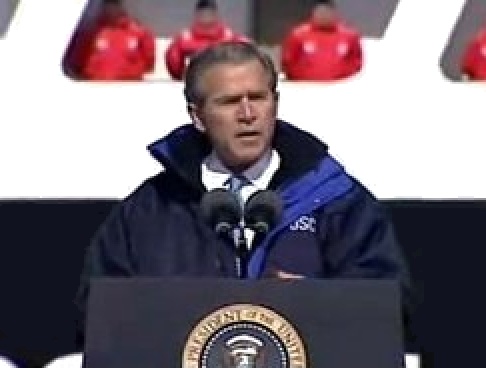 posted by Quiddity at 3/31/2003 02:38:00 PM
posted by Quiddity at 3/31/2003 02:38:00 PM
0 comments
Thanks, we needed that: Peggy Noonan writing in the Wall Street Journal in a column titled " We Can Take It The benefits of the long haul" has this to say: - Unanticipated good can come from misfortune.
- ... this is going to take a while. And that is going to surprise some Americans, including probably some wearing our uniform.
- The second Gulf War will not be quick. ... A resentful world is about to see that America had to fight for it. They are about to see America could fight for it--that we had and have the stomach for a struggle.
- The world will be reminded that America still knows how to suffer. In a county as in an individual, the ability to withstand pain--the ability to suffer--says a great deal about character. It speaks of maturity and courage, among other things. The world knew half a century ago that America will absorb pain to reach progress. It is not all bad that they are seeing it again.
- Americans too may be heartened to see that we know how to absorb pain. Deep in the heart of many pro-invasion thinkers has been a question they do not ponder for it could only be answered in time. It was: Can we still take it? It won't be bad for us to see that the answer is yes.
- Our armed forces, the professionals, are going to learn that they can do it. They've wondered too. They are also going to learn how to do their jobs better, because they're really going to have to do the job. They are not going to feel when they return that they got all dressed up and the party was canceled.
Feeling better now? The pain and suffering is good for you. Oh, and how about the condescension towards the military? Some in uniform will be surprised? And they are going to learn how to do their jobs better because they will have to. It sure is easy to talk big when you're sitting comfortably far from the action.
posted by Quiddity at 3/31/2003 08:41:00 AM
0 comments
Required reading: In the Observer, there is an thought-provoking essay by Will Hutton on Tony Blair and American conservatives. Mostly about the conservatives. Excerpts: ... a new generation of intellectual conservatives took on the apparently effortless liberal dominance, and beat it at its own game - the realm of ideas. The great right-wing thinktanks - the Heritage Foundation, the American Enterprise Institute and the Hoover Institute - became the intellectual inspiration of the conservative revival. The rich were virtuous and moral because they worked hard; the poor worthless and amoral because they had not boot-strapped themselves out of poverty. Welfare thus bred a dependency culture, they claimed, and made poverty worse. Taxation was an act of coercion and an affront to liberty. Markets worked like magic; choice was always better than public provision. Corporations spearheaded wealth creation. Conservatism was transmuted into a moral crusade. and The capture of universities by the rich and the lack of education for the poor has meant that social mobility in the US has collapsed. American capitalism, in thrall to the stock market and quick bucks it offers, has hollowed out its great corporations in the name of the hallowed conservative conception of share-holder value - the sole purpose of a company is to enrich its owners. Productivity and social mobility are now higher in Old Europe than in the US - despite a tidal wave of propaganda to the contrary. Is it true that social mobility is higher in Old Europe than in the U.S.? If so, that's quite a development.
posted by Quiddity at 3/31/2003 08:04:00 AM
0 comments
Sunday, March 30, 2003
Here's one cook that spoils the broth:  posted by Quiddity at 3/30/2003 02:47:00 PM
posted by Quiddity at 3/30/2003 02:47:00 PM
0 comments
Ugly: 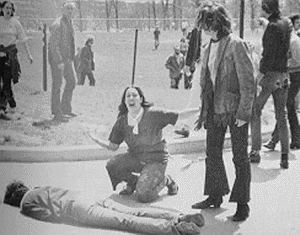 | From the New York Post. An editorial by the paper:March 30, 2003 -- Where's the Ohio National Guard when you really need it?
Seriously?
Hey, if a campus crank can wish for personal calamity to befall U.S. forces in Iraq, why not fantasize about a volley of Kent State-style militia musketry rattled off in his general direction?
Not that Nicholas De Genova, an untenured prof of something or other at Columbia University, is worth the effort.
Even if he did publicly call for a resounding American defeat in Iraq.
...
Freedom of expression works two ways, after all.
Oh, and just kidding about Kent State.
Free speech, don't you know. |
|
NOTE: The photograph of the Kent State shooting was not part of the editorial. We posted it to remind people what the editorial was referring to.
posted by Quiddity at 3/30/2003 01:19:00 PM
0 comments
A neocon who really doesn't get it: What does WIlliam Kristol - fierce advocate of the Project for the New American Century - have to say in the wake of discouraging news about the war in Iraq? Apparently nothing about planning, diplomacy, or tactics - even though he's a key figure in shaping the policy that led to the invasion. Instead, he has this to say: (From the panel discussion on Fox News Sunday for 30 March 2003) I would say this: I think American liberalism and the Democratic party are now facing a big split. They seem to face one about once every generation. In 1948 the Truman forces won out over the Henry Wallace forces, and the anti-Communists drove the fellow travelers out of the Democratic party. In 1972 the McGovern forces defeated the Scoop Jackson forces - the Scoop Jackson hawks ended up in the Republican party mostly. We now have a split coming in liberalism that's equally deep and significant, I think. Dick Gephart Democrats, a lot of the Democratic foreign policy establishment, Washington Post editorial page - they want America to win this war and they mostly support the President and the conduct of the war. And they've had their differences with the Bush administration - God knows - but they are pro-American liberals. I really honestly now believe that a certain chunk of the Democratic party, a higher chunk of the liberal commentators, take a certain relish in the fact that when something goes badly in the war, they hate the Bush administration more than they love America. And that is a very bad situation. And I very much hope - it's not really for me to get involved in intra-liberal fights - but I very much hope the decent pro-American liberals, people like Dick Gephardt - Hillary Rodham Clinton, incidentally, has been very good on this, certainly in the last two or three weeks - the Dick Gephart liberals prevail over the anti-American left- which I now see to a degree that really surprises me. and It's a crisis for the American left. UPDATE: We should've known this: Kristol was repeating lots of material from a column he'd just written in his magazine, The Weekly Standard.
posted by Quiddity at 3/30/2003 01:08:00 PM
0 comments
MORON: Heard on ABC's This Week: George Will: Look, this is as Secretary Baker said to you, "a war of choice", and in order to encourage that choice to get made, some people oversold this - perhaps Perle and some others, who are actually not officeholders in the administration.
Michele Martin: Defense advisory board, George, he was the chairman of it.
George Will: I understand that - [but] it's an unpaid position and it's not setting policy. From the newswire: Perle offers to resign from U.S. Defense Policy Board
Noting criticism of a possible conflict of interest over his roles as corporate adviser and Defense Department consultant, Perle wrote to Defense Secretary Donald Rumsfeld, "As I cannot quickly or easily quell criticism of me based on errors of fact concerning my activities, the least I can do under these circumstances is to ask you to accept my resignation as chairman of the Defense Policy Board."
posted by Quiddity at 3/30/2003 10:04:00 AM
0 comments
Famous last words:  posted by Quiddity at 3/30/2003 09:00:00 AM
posted by Quiddity at 3/30/2003 09:00:00 AM
0 comments
Saturday, March 29, 2003
Then and now: 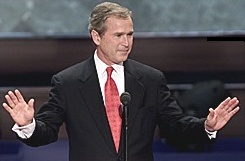 | 3 August 2000
From Bush's acceptance speech:"Our military is low on parts, pay and morale.
If called on by the commander-in-chief today, two entire divisions of the Army would have to report: Not ready for duty, sir." | | 32 months later... | 29 March 2003
From the (London) Times Online:What was supposed to be a ten-day sprint towards Baghdad ended yesterday when the US Marines 11th regiment came to rest. The force had all but exhausted its supplies of fuel, food rations, ammunition and water, and morale was at an all-time low.
...
Some units were down to just one day's supply of food. Many of the vehicles' fuel gauges were close to the red. |
posted by Quiddity at 3/29/2003 10:04:00 PM
0 comments
All hail Dear Leader!For a completely irreverent look at Bush and (hero) worship, take a look at the weblog: The Temple of George W. BushWe recommend starting at the bottom of the page (hit "End" on your keyboard) and scrolling up. Contains hilarious PhotoShop-like work. UPDATE: This is not a joke: US soldiers in Iraq asked to pray for Bush (link from Counterspin) Excerpts: "I have committed to pray for you, your family, your staff and our troops during this time of uncertainty and tumult. May God's peace be your guide," says the pledge, according to a journalist embedded with coalition forces.
The pamphlet, produced by a group called In Touch Ministries, offers a daily prayer to be made for the US president ...
Sunday's is "Pray that the President and his advisers will seek God and his wisdom daily and not rely on their own understanding". Yes, don't rely on "understanding", which is bothersome rational thinking.
posted by Quiddity at 3/29/2003 07:20:00 PM
0 comments
demagogue: We normally try to limit our (and uggabugga's readers) exposure to Rush Limbaugh, but this item calls out for attention: In a New York Times story about conservative pundits, we read: (emphasis added) An article in The Washington Post, in which defense officials were quoted yesterday as saying that the war could grind on for months, has become a rallying point for the conservatives' indignation.
...
Mr. Limbaugh began his radio program with a harsh critique of the article. "If you read that, you conclude we're losing this war, that we've got no way out, that we are hemmed in and we are hopelessly lost," he said. "Now, I have to say that even I thought it would take the mainstream media more than a week to attempt to undermine the war effort. I didn't think it would happen this soon." Got that? Limbaugh isn't saying that the "mainstream media" is inadvertently undermining the war effort - which is unbelievable considering all the stories about "our gallant guys and gals in uniform". No. Limbaugh is saying that the mainstream media is attempting to undermine the war effort. That it's their goal. This is not too different from Joe McCarthy accusing the U.S. Army of harboring communists. When the right is swinging wildly at every thing in sight, it's a sign that they've become completely unhinged - and perhaps about to lose the public debate. We can only hope so.
posted by Quiddity at 3/29/2003 12:41:00 PM
0 comments
Friday, March 28, 2003
Are you ready for this? Fred Barnes writes in the Weekly Standard: (selected quotes, emphasis added) - WHEN PRESIDENT BUSH set aside the Pentagon's strategy for war with Iraq and ordered an attack on Saddam Hussein and his inner circle ... the president behaved, without much ado, as a commander in chief who intends to make the major war decisions himself and not reflexively defer to the expertise of military brass.
- Bush relied on his own judgment and instincts ...
- Bush has wisely read and imbibed the advice of military strategist Eliot Cohen in "Supreme Command," a study of successful wartime leaders from Lincoln to Churchill. The common thread among those leaders was their insistence on taking charge, personally and aggressively, and not leaving decisions to the military.
- The president should be as active in making decisions on postwar Iraq as he has been in the war itself. No doubt the State Department, the United Nations, the European Union, and God knows who else will want to impose their thinking. Rather than defer, Bush should again trust his own judgment.
posted by Quiddity at 3/28/2003 08:43:00 PM
0 comments
Did you know? 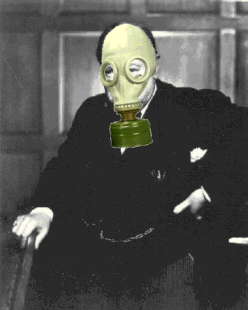 | From The Straights Times:According to historians, Britain used poison gas to quell a 1920 tribal uprising in the northern Kurdish town of Kirkuk.
Arguing strongly for the use of mustard gas in 1919, Winston Churchill -- then a secretary of state in Britain's War Office -- said he did not understand the 'squeamishness about the use of gas'.
'I am strongly in favour of using poison gas against uncivilised tribes,' the former British prime minister was quoted in Iraq: From Sumer To Saddam, by Iraqi expert Geoff Simons. |
posted by Quiddity at 3/28/2003 07:11:00 AM
0 comments
Wednesday, March 26, 2003
The situation so far: 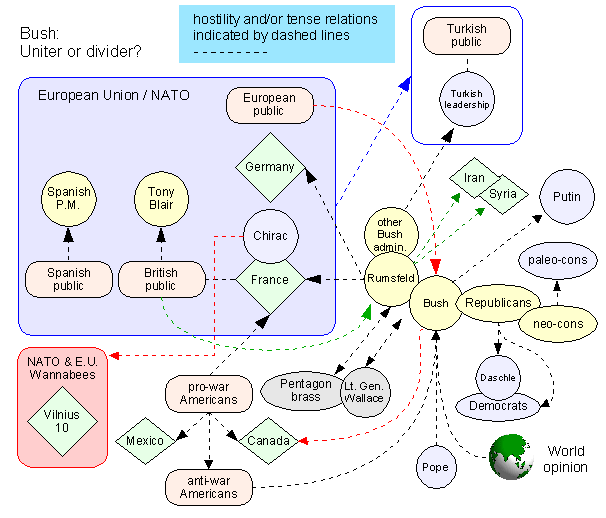 NOTE: These relationships are fluid and some tensions have abated (e.g. Blair vs British public). We've tried to indicate those "divisions" that were of significant intensity and duration over the last several months.
posted by Quiddity at 3/26/2003 10:11:00 AM
0 comments
Tuesday, March 25, 2003
What about these items? With all the action in Iraq, we thought we'd list some stories we haven't been reading about. They are: - The British budget. If everybody is excited about what it's costing the U.S., what's the impact over in Britain? They normally spend less on defense than the French (~$31 bil vs ~$46 bil), and this war isn't cheap. Will it become an issue? When will it be brought up in Parliament?
- North Korea. Hello? Anybody home?
- What about those three mysterious visits to the White House by Greenspan recently? Are we facing a currency crisis?
- Isn't it about time for another tape from bin Laden? ... especially considering the circumstances. Osama talks big, but when there's a war on, he clams up. We're not impressed.
- For all the speculation about the Iraqi war being congruent with Christian apocalyptic prophecy, how come nobody is making hay on the topic? Our quick review of religious broadcasters comes up empty. Or maybe we need a massive dust storm before the countdown begins.
- The "Arab street" hasn't been especially volatile. What's up with that?
posted by Quiddity at 3/25/2003 10:44:00 PM
0 comments
Recommended reading: SullyWatch has an excellent posting about the National Review, paleo- vs neo-conservatives, the history of the right over the last couple of decades, and more. We agree with pretty much all that's there. However, as part of this discussion, some observers ( not SullyWatch) have proclaimed the Weekly Standard to be a reasonably decent conservative magazine - at least in comparison to the National Review. We beg to disagree. Back in the late 90's, the Weekly Standard was one of the fiercest advocates of impeaching Bill Clinton (and we've got the old magazines to prove it!). They've engaged in some pretty wild stuff over the years (e.g. Fred Barnes predicting that when the Panama Canal reverts to local control, the locks will jam, all hell breaks loose, the U.S. will have to step in), and show no signs of moderation. Sorry to say it, but there aren't any reasonable conservative publications out there. At least there are none that reject the crackpot economic theories of Steve Forbes and Larry Kudlow, the coercive social policies of Marvin Olasky, the pre-Enlightenment world view of Antonin Scalia, the "progress goes against Nature" perspective of Leon Kass, and the Napoleonic geopolitics of any number of prominent administration figures.
posted by Quiddity at 3/25/2003 02:39:00 PM
0 comments
Monday, March 24, 2003
Sullivan tells Britain the truth?In the Sunday Times, Andrew Sullivan writes: ... one thing I can relay from Washington. The closer you get to people who actually know [president Bush], who deal with him, who observe him, the greater the respect you hear. In a cabinet of heavy-weights, you'd expect in these tense circumstances a certain amount of grandstanding, of leaks to the press about who is really running the country, a buzz of rivalry and condescension and personal spin that is actually the norm in most administrations. But instead, you hear something rather different: that Bush really is in charge, that he has earned the deepest respect of those with far more experience than he has, that he is as steady as he is calm, as determined as he is pragmatic. For a different perspective on who's in charge and who respects whom, see this revealing portrait as reported at busybusybusy.
posted by Quiddity at 3/24/2003 11:58:00 AM
0 comments
Sunday, March 23, 2003
Are we having fun yet? This is our guess of what Andrew Sullivan is doing right this moment: 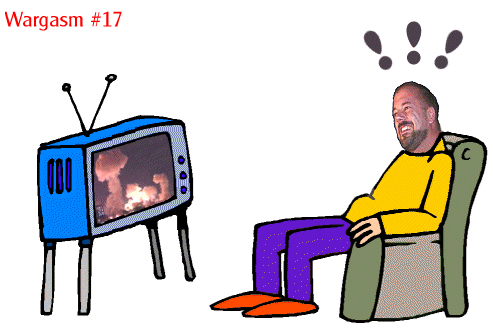 posted by Quiddity at 3/23/2003 09:29:00 AM
posted by Quiddity at 3/23/2003 09:29:00 AM
0 comments
Saturday, March 22, 2003
Connections: Derived in part from this New York Press item. 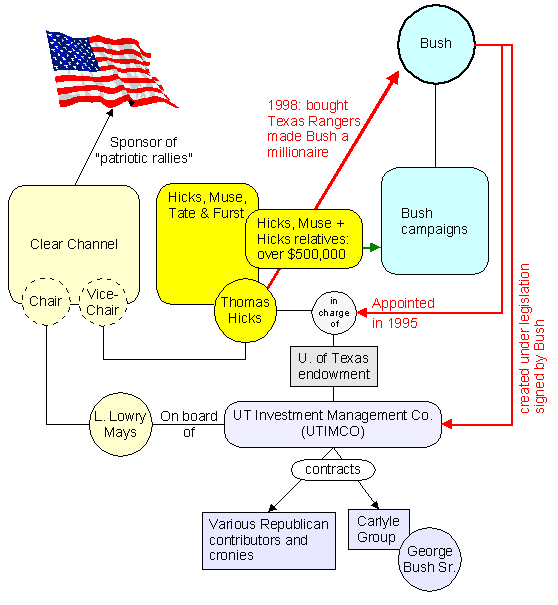 posted by Quiddity at 3/22/2003 10:15:00 AM
posted by Quiddity at 3/22/2003 10:15:00 AM
0 comments
The right never rests: Donald Luskin, writes in the National Review Online an article entitled: Meet the Krugman Truth Squad, which is an essay about Krugman "fact checkers". These "checkers" include Luskin himself. Here's an example of how these folks operate: Krugman writes:"The members of the Bush team don't seem bothered by the enormous ill will they have generated in the rest of the world. ... Victory in Iraq won't end the world's distrust of the United States because the Bush administration has made it clear, over and over again, that it doesn't play by the rules. Remember: this administration ... mortally insulted the Turks ..." Luskin-approved "fact checker" Hoystory writes:"Insulted the Turks? They don't sound too insulted to me."
[That's a link to a brief AP wire story, "Turkey races for vote on U.S. troops", about Turkish leadership moving for a vote on basing troops. Which in the end, wasn't granted.] That's the quality of "Krugman fact checking" these days.
posted by Quiddity at 3/22/2003 09:19:00 AM
0 comments
Letter to Bush: At this site, you can read congressman Henry Waxman's letter to president Bush regarding the "evidence" that Iraq was seeking to obtain uranium from Africa. It contains detailed accounts of who knew (and said) what, and when. Interesting reading.
posted by Quiddity at 3/22/2003 08:38:00 AM
0 comments
Friday, March 21, 2003
Humor impaired: Andrew Sullivan posts this: CAN DASCHLE GET ANYTHING RIGHT? Apparently not.
UPDATE: This photo appears to be a hoax. I apologize. The picture that Sullivan thought might be legit, is this: 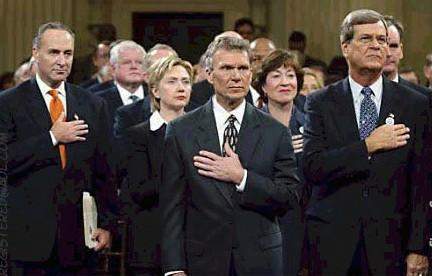
Amazing.
posted by Quiddity at 3/21/2003 08:10:00 PM
0 comments
Following in the footsteps of Arthur "Bomber" Harris:  posted by Quiddity at 3/21/2003 07:22:00 PM
posted by Quiddity at 3/21/2003 07:22:00 PM
0 comments
Thursday, March 20, 2003
Dead or alive? Left photo from 17 July 2002. Right photo from television address 20 March 2003. 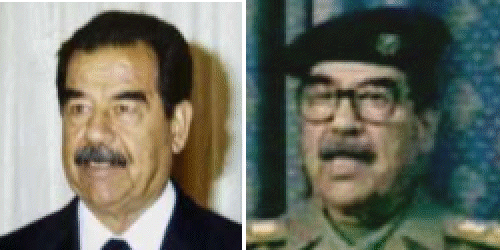 Looks like the same guy to us.
posted by Quiddity at 3/20/2003 10:35:00 AM
0 comments
Wednesday, March 19, 2003
Ugh: Daschle: "I'm saddened, saddened that this president failed so miserably at diplomacy that we're now forced to war. Saddened that we have to give up one life because this president couldn't create the kind of diplomatic effort that was so critical for our country."
- House Speaker J. Dennis Hastert: "Those comments may not undermine the president as he leads us into war, and they may not give comfort to our adversaries, but they come mighty close."
- New York Post Editorial: In point of fact, they do give comfort to America's enemies.
The American people are rightly incensed by the Democrats' outrageous rhetoric.
- House Majority Leader Tom DeLay: "Is Tom Daschle the official Democrat hatchet man or just a taxpayer-funded pundit?"
"Fermez la bouche, Monsieur Daschle." (That translates roughly as "Shut your mouth, Mr. Daschle.")
- Sen. Rick Santorum, Pennsylvania Republican: "I think Senator Daschle clearly articulated the French position ..."
- White House Press Secretary Ari Fleischer: "He's essentially blaming President Bush for the fact that we may be on the verge of war."
- Rush Limbaugh: [That was] Senator Tom Daschle's vicious attack - the "politics of personal destruction" - against President George W. Bush ...
If I were Daschle, I'd be ashamed to act this way. Every politician in Washington said "we are now united" after those attacks [of 9/11], but it seems some of them were only mouthing words.
- Jonah Goldberg: [Diplomacy failed when] French showed their cards: opposing Bush is more important than their integrity. It's sad to say, but it looks like Daschle is holding the same cards.
- National Review's Kathryn Jean Lopez: You know, I found the lack of partisanship right after Sept. 11 uncomfortable. But Tom Daschle isn't being partisan. The guy's just lost his mind.
- Hugh Hewitt (in the Weekly Standard): SENATOR TOM DASCHLE'S attack on President Bush on Monday was unprecedented for the leader of the opposition party in Congress, but high-profile Americans have a long history of getting it wrong on matters of war and peace. Most famous among these is Charles Lindbergh ...
Lindbergh's efforts were not without harm.
[Historians deal] with Lindbergh in a footnote. A future historian of the war to liberate Iraq may not be so generous with Senator Daschle. ... At some point the American public deserves to have the proponents of vulnerability at home and indecision abroad rebuked.
- Republican National Chairman Marc Racicot: [Called Daschle's remarks] "divisive and brazen political posturing."
"It is disheartening and shameful for Senator Daschle, who has previously advocated and authorized the use of force in Iraq, to now blame America first."
- Senate Majority Leader Bill Frist: "Our men and women literally are in a countdown before fighting is initiated, and any remarks that their lives in some way have been compromised by the president of the United States is irresponsible."
- Tucker Carlson (CNN Crossfire co-host) : According to Tom Daschle we are going to war not because Saddam possesses and has used weapons of mass destruction, not because Saddam has trained and harbored terrorists, not because of Saddam's existence threatens the entire civilized world. No. American troops will die because George W. Bush couldn't convince France and Germany to what? Daschle didn't even say. Maybe he'll explain further the families of fallen American Soldiers.
[Carlson reads a letter to Crossfire] "As a U.S. Army retiree and war veteran, I was furious when I heard what Daschle had to say yesterday. He would say or do anything for his party's political gain and to make President Bush look bad. Yesterday, Daschle did it by spitting in the face of our sons and daughters who serve and are ready to fight a war." - Sen. James Inhofe (R - Oklahoma): "I call on Senator Daschle to apologize."
- Michael Barone (USN&WR): Like a vulture hovering over the battlefield, Daschle is seeking gains from deaths in war.
NOTE: We're still waiting for Andrew Sullivan to weigh in on this issue.
posted by Quiddity at 3/19/2003 04:39:00 AM
0 comments
Tuesday, March 18, 2003
Will this be an easy war? We were struck by the following statements made by Bush last night: - Saddam Hussein and his sons must leave Iraq within 48 hours.
- It is not too late for the Iraqi military to act with honor and protect your country by permitting the peaceful entry of coalition forces ...
- Our forces will give Iraqi military units clear instructions on actions they can take to avoid being attacked and destroyed.
- I urge every member of the Iraqi military and intelligence services, if war comes, do not fight for a dying regime ...
- And all Iraqi military and civilian personnel should listen carefully to this warning. In any conflict, your fate will depend on your action. Do not destroy oil wells, a source of wealth that belongs to the Iraqi people. Do not obey any command to use weapons of mass destruction against anyone, including the Iraqi people. War crimes will be prosecuted. War criminals will be punished.
Now some of that is standard-issue talk, but we think that if the Iraqis do fight, it won't be be the cakewalk everybody is expecting. That's why Bush was promoting the notion of Saddam-in-exile and Iraqi troops throwing down their arms.
posted by Quiddity at 3/18/2003 11:03:00 AM
0 comments
What did we learn? In the past several weeks we've been hearing about how September 11 "changed everything", that "we learned something important" on that day, and that Bush is taking "the lesson of September 11 to heart". However, nobody has said exactly what it was that had changed, or what we had learned. For the most part "September 11" was an empty slogan used to promote the notion of invading Iraq. But before dismissing it entirely, we took a hard look to see what, if anything, the attack taught us. As far as we can tell, there were two discoveries: (1) That there is a non-state sponsored group out there that wants to kill many civilians (as opposed to government officials or a government's security apparatus),
and
(2) that - despite limited resources - somebody figured out a way to do it. But that's all. Some analysts have made the mistake of equating an attack that caused mass destruction with actually having the means to inflict mass destruction (or being close to getting them). Al Qaeda doesn't have gunboats or bombers or missiles - even though that's what you'd normally need in order to bring down the twin towers. By confusing results with means, al Qaeda is perceived as being mightier than it really is. We diagram the various flavors of terrorism, their resources and limitations, levels of threat, and approaches to contain them below: 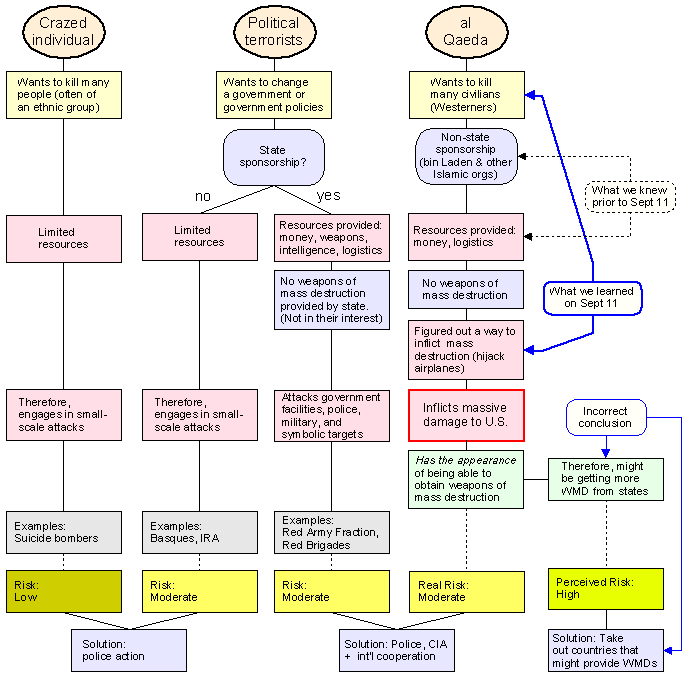 posted by Quiddity at 3/18/2003 10:52:00 AM
posted by Quiddity at 3/18/2003 10:52:00 AM
0 comments
Monday, March 17, 2003
Happy St. Patrick's day!  posted by Quiddity at 3/17/2003 01:06:00 PM
posted by Quiddity at 3/17/2003 01:06:00 PM
0 comments
Sunday, March 16, 2003
Unworthy? There has been a lot of talk from pro-war circles about how France shouldn't have a veto: It was never merited; France is a medium power at best; its glory days are well over; etc. But take a look at how France stacks up against the rest in terms of military spending. It's pretty substantial (and a bigger percentage of GDP than most). [Shaded cells = permanent Security Council member.] | country | GDP | military | | U.S.A. | $10.082 trillion | $276.7 billion | | China | $5.560 trillion | $55.0 billion | | France | $1.540 trillion | $46.5 billion | | Germany | $2.184 trillion | $38.8 billion | | Russia | $1.200 trillion | $33.0 billion | | Gr. Britain | $1.470 trillion | $31.7 billion | | Italy | $1.402 trillion | $20.2 billion | | Saudi Arabia | $ .241 trillion | $18.3 billion | | Brazil | $1.340 trillion | $13.4 billion | | India | $2.660 trillion | $12.0 billion | | Australia | $ .465 trillion | $9.3 billion | | Israel | $ .119 trillion | $8.8 billion | | Spain | $ .828 trillion | $8.6 billion | | Canada | $ .875 trillion | $7.8 billion | source: CIA World Factbook. Expenditures are from budgets in 2000, 2001, or 2002 (varies by country) NOTE: Figures for China and Russia are hard to come by. Even the CIA won't give a number for Russia, and has a wide range for China (e.g. "$20.048 billion (2002); note - this is the officially announced figure, but actual defense spending more likely ranges from $45 billion to $65 billion for 2002")
posted by Quiddity at 3/16/2003 10:57:00 PM
0 comments
Harsh:The Toronto Star publishes a tough anti-Bush OpEd entitled Pliable Bush puppet of hawks And there is this critical profile from the Globe and Mail, The dubious genius of Dubya
posted by Quiddity at 3/16/2003 01:14:00 PM
0 comments
This is really ugly: From the New York Times: Bush Pushes Plan to Curb Medicare Appeals
The Bush administration says it is planning major changes in the Medicare program that would make it more difficult for beneficiaries to appeal the denial of benefits like home health care and skilled nursing home care.
[...]
In the last year, Medicare beneficiaries and the providers who treated them won more than half the cases — 39,796 of the 77,388 Medicare cases decided by administrative law judges. ... Under federal law, the judges are independent, impartial adjudicators who hold hearings and make decisions based on the facts. They must follow the Medicare law and rules, but are insulated from political pressures and sudden shifts in policy made by presidential appointees.
President Bush is proposing both legislation and rules that would limit the judges' independence and could replace them in many cases. The administration's draft legislation says, "The secretary of health and human services may use alternate mechanisms in lieu of administrative law judge review" to resolve disputes over Medicare coverage. Under the legislative proposal, cases could be decided by arbitration or mediation or by lawyers or hearing officers at the Department of Health and Human Services.
[...]
That would be a significant change. Administrative law judges are now required to follow Medicare statutes and regulations, but not the agency's policies. As a result, the judges often grant benefits previously denied by the Medicare agency or its contractors.
posted by Quiddity at 3/16/2003 06:02:00 AM
0 comments
Saturday, March 15, 2003
History lesson: In the President's radio address today, Bush said the following: We know from recent history that Saddam Hussein is a reckless dictator who has twice invaded his neighbors without provocation ... He's referring to the move into Iran in 1980 and Kuwait in 1990. We agree that Hussein was out of line invading Kuwait - but what about the case involving Iran? One person who thinks Iraq was provoked in 1980 is Nita M. Renfrew, who wrote an article in Foreign Policy (no 66, Spring 1987) entitled Who Started The War?Here are excerpts from that piece: - ... although organized units of the Iraqi army were the first to cross the Iran-Iraq border on September 22, 1980, Iran started the war.
- The long-term historical cause of the war was the progressive breakdown, after Khomeini took power, of the 1975 Algiers accord. Usually viewed as a treaty settling key border disputes between Iran and Iraq, the accord was more importantly an agreement between Iran and Iraq not to interfere in each other's internal affairs. The Shah invoked this provision of the accord in 1978 when he called on Hussein to expel Khomeini from Iraq ...
- When Iraq signed the accord, it hoped to settle three issues: the disputed border territories of Zain al-Qaws and Saif Saad, both strategic heights overlooking the Iraqi plains and occupied by Iran; the question of sovereignty over the Shatt al Arab waterway ...; and most important, the Kurdish revolt in the north, heavily and covertly supported by the shah in concert with Israel and the United States.
- Iraq agreed to give up sovereignty over half of the Shatt al Arab by moving its southeastern border away from the far shore of the waterway to the thalweg, the deepest part of the Shatt ...
- Iraq's border with Iran had already been moved back twice in this century: once in 1913 by the Constantinople Protocol negotiated between the Persian and Ottoman empires and again in 1937 by a League of Nations settlement. The rationale for this third border adjustment was that a thalweg is the line of demarcation normally used between countries when the border is along a waterway.
- In exchange for one-half of the Shatt al Arab, the Shah agreed to stop inciting the Kurds to rebellion and to return the occupied territories of Zain al-Qaws and Saif Saad, which make up 210 square miles along the middle section of the border.
- Four years later, when Khomeini returned to Qom, the religious center of Iran, Iran had still not returned Iraq's two territories, although Iran had taken official possession immediately of half of the Shatt al Arab.
- [The Iraqis] made a serious effort to establish good relations with the new Iranian regime ... [But] the Algiers acord soon began to break down on two counts: Khomeini commenced a well-financed campaign to turn the Shiites in Iraq, who make up more than one-half of the population, against the Sunni-controlled government, and he stepped up violations of airspace and border clashes, which had largely ceased in 1975. By the summer preceding the Iraq's invasion, they were taking place almost daily.
- By the fall of 1979, a year before the war broke out, border hostilities were escalating and demonstrations were being staged in front of the Iraqi embassy and consulates in Iran. Armed attacks took place along the border, and an assault on the Iraqi embassy in Tehran in injured Iraqi diplomats.
- By spring 1980, top Iranian officials were proclaiming openly their intention to liberate Iraq from their Sunni oppressors. [...] A prominent Iranian military official stated that Iraq was an integral part of Iran. Meanwhile, inside Iraq there were Iranian-sponsored assassination attempts on Hussein and members of his cabinet. Bombs exploded in several ministries and at the Mustansiriyah University, killing and wounding hundreds.
- Members of the Iraqi Revolutionary Command Council now differ on whether the decision to invade Iran should be traced to the precarious internal situation or to border tensions. At the time both factors played a role.
- According to Iraqi sources, in summer 1980 Iran began to mass its army along the border in larger numbers and fired several times on Iraqi oil installations. On September 4 Iran shelled the Iraqi towns of Khanaqin, Mandali, Naft Kanch, and Zarbatiyah. In the minds of Iraqi leaders, the war began with that shelling. Iraq called on the Iranian government to review the terms of the Algiers accord, giving Iran a last chance to avoid war and still save face, and informed Iran that it was going to remove, by force if necessary, the occupying troops if they did not leave voluntarily. Again, Iran opened fire. It struck oil installations, attacked Mandali from the air, fired on Iraqi ships in the Shatt al Arab, and shelled Basra, Iraq's primary port.
- On September 22, 1980, Hussein launched an invasion of Iran, within 6 days occupying a substantial belt along the border. He then called for a cease-fire and negotiations, both of which Khomeni unequivocally turned down.
posted by Quiddity at 3/15/2003 01:04:00 PM
0 comments
Friday, March 14, 2003
FYI: | country | GDP | military | | Russia | $1.200 trillion | $33.0 billion | | China | $5.560 trillion | $55.0 billion | | | | | | Germany | $2.184 trillion | $38.8 billion | | France | $1.540 trillion | $46.5 billion | | Gr. Britain | $1.470 trillion | $31.7 billion | | Italy | $1.402 trillion | $20.2 billion | | Spain | $ .828 trillion | $8.6 billion | | | | | | U.S.A. | $10.082 trillion | $276.7 billion | | | | | | Saudi Arabia | $ .241 trillion | $18.3 billion | | Israel | $ .119 trillion | $8.8 billion | | Iraq | $ .059 trillion | $1.3 billion | | | | | | Brazil | $1.340 trillion | $13.4 billion | | Australia | $ .465 trillion | $9.3 billion | | Canada | $ .875 trillion | $7.8 billion | Figures from CIA factbook (except for Russian military expenditures) CLARIFYING NOTE: The figures are for years 2000-2002 (varies by country), and the U.S. military budget is currently over $300 billion, but we wanted to present a rough outline of how each country ranks in terms of economic strength and military expenditures.
posted by Quiddity at 3/14/2003 12:21:00 PM
0 comments
Thursday, March 13, 2003
Bush's brain: One of our hobbyhorses is speculating what, if any, brain damage the president has experienced. We're basing this on the acknowledged heavy drinking by Bush, plus the unacknowledged heavy cocaine use. And there is Bush's conversion to Christ and extreme dedication to exercise (principally running). What's the dynamic there? We'll probably not know the full details until 50 years have transpired and confidential notes and records are released. Until then, we'll have to see if Bush's behavior in public can limn a profile of what's inside his head. One person who's taken a stab at it is William Thomas, senior reporter for Lifeboat News, who wonders : IS BUSH NUTS? We think the essay leaves a lot to be desired, but if you want to engage in speculation, put on your tin-foil hat and give it a read.
posted by Quiddity at 3/13/2003 07:52:00 AM
0 comments
Elizabeth Smart fatigue: Enough already!
posted by Quiddity at 3/13/2003 07:18:00 AM
0 comments
Wednesday, March 12, 2003
Another item Powell can point to: Following the successful development of a balsa wood and duct tape drone, top Iraqi scientists have continued to push the envelope. Here, we see the latest: The M21 Infantry Fighting Vehicle, constructed out of plywood, rolling on wheels taken from Radio Flyer wagons, and not needing any gasoline for power. This terrifying weapon could be pushed across the Canadian-U.S. border, deflect a hail of fire from a BB-gun, and perhaps dent a car door before rolling to a stop. 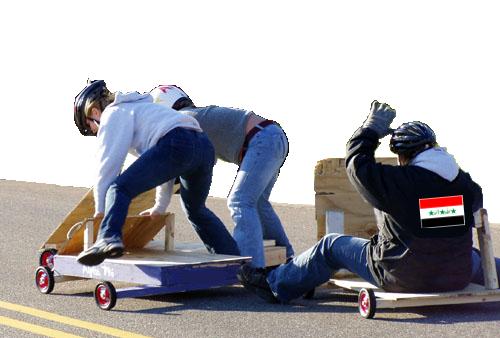 posted by Quiddity at 3/12/2003 12:47:00 PM
posted by Quiddity at 3/12/2003 12:47:00 PM
0 comments
Wait for for the all the facts before pontificating.Andrew Sullivan posted on 8 March 2003: THE DRONE AND BLIX: What can account for Hans Blix's burial of the serious news of a Saddamite drone aircraft capable of deploying chemical weapons on neighboring countries?
[...]
The drone could also presumably be used against American and British and Australian troops. From the wires on 12 March 2003: Al-Taji, Iraq -- A remotely piloted aircraft that the United States has warned could spread chemical weapons appears to be made of balsa wood and duct tape, with two small propellors attached to what look like the engines of a weed whacker. ... Today's lesson is, don't jump to conclusions! In fact, we'll heed our own advice and note that we're not sure if the balsa wood drone is the one Blix (and Powell) were referring to - though it seems likely. Guess we'll have to wait a day or two for clarification. A fuller story is here, and includes a photograph (click on thumbnail) of the aircraft.
posted by Quiddity at 3/12/2003 07:43:00 AM
0 comments
Monday, March 10, 2003
Bible code-breakers: On March 8, Bill Keller wrote in the New York Times: Two weeks ago, a group of senior intelligence officials in the Defense Department sat for an hour listening to a briefing by a writer who claims - I am not making this up - that messages encoded in the Hebrew text of the Old Testament provide clues to the whereabouts of Osama bin Laden. One of the officials told me that they had agreed to meet the writer, Michael Drosnin, author of a Nostradamus-style best seller, without understanding that he was promoting Biblical prophecy. On March 11, Michael Drosnin's letter to the newspaper is published: I am the author of "Bible Code II: The Countdown," mentioned by Bill Keller in his March 8 column.
My Pentagon briefing about the Bible Code took place on Feb. 21 and was attended by top military intelligence officials.
[...]
Why do United States and Israeli intelligence take the code seriously? Not, as Mr. Keller writes, because "we're all a little too desperate these days," but because the Bible Code keeps coming true. The "Bible Code keeps coming true"? Well, that's because you can read almost anything out of the Bible, or even the novel Moby Dick - as this analysis shows. Also, the book/technique was debunked six years ago in the Skeptical Inquirer. On the other hand, maybe it fits in nicely with Bush's view that "Events aren't moved by blind change and chance" but by "the hand of a just and faithful God." as this NYT-Op-Ed notes.
posted by Quiddity at 3/10/2003 10:40:00 PM
0 comments
Issue du jour: Much talk has sprung from Richard Perle's comments yesterday on CNN's Late Edition. He was asked about a New Yorker article by Seymour Hersh that was critical of Perle, and said, "Sy Hersh is the closest thing American journalism has to a terrorist." We read it, and it implies that Perle is co-mingling his defense policy work with his business interests - although more needs to be learned to make a definitive judgment. What did Hersh's article tell us? That the following connections exist: 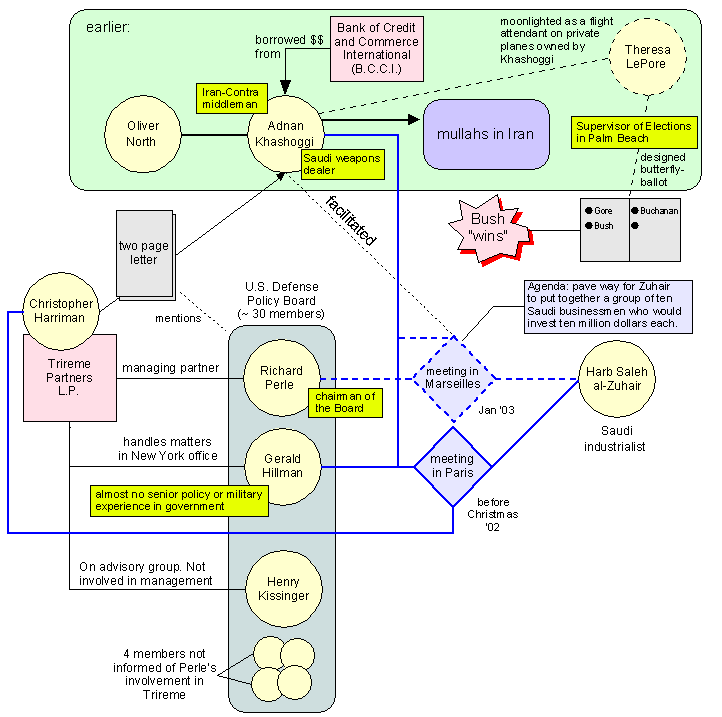 Thanks to Cursor.org for alerting us to this issue (and Atrios too). UPDATE: Atrios reminds us that Khashoggi has a connection to Theresa LePore of Palm Beach butterfly ballot fame, so we've added that item.
posted by Quiddity at 3/10/2003 10:32:00 AM
0 comments
Sunday, March 09, 2003
Food for thought: Somebody we've never heard of before, William S. Lind (of UPI), wrote an interesting essay about a war with Iraq. Excerpt: ... the real threat the United States and the American people now face is non-state players such as al Qaida, Hamas, Hezbollah and the like who have been grimly effective pioneers of non-state and extra-state forms of conflict that I and other military analysts have termed Fourth Generation warfare. They can only benefit from a U.S. war waged against Iraq -- regardless of how it turns out.
If we win, the institution of the state is further discredited in the Islamic world, and more young men will give their allegiance to non-state forces that the U.S. military with its current configuration and extremely weak human intelligence assets will find exceptionally hard to defend against. And if Saddam wins, their own governments will look even less legitimate, because they failed to stand with him against the hated American neo-Crusaders. UPDATE: Atrios tells us that William Lind is a bigwig in Paul Weyrich's Free Congress foundation, and has written things like What If The South Had Won The Civil War? (concluding that it might have been a good thing) Next time, we'll be more careful when citing anything from the UPI.
posted by Quiddity at 3/09/2003 12:43:00 PM
0 comments
What Bush is doing:For the last couple of years we've been saying to our friends that Bush's long-term goal can be summarized in one sentence: Defund the federal government. We are pleased to see that this perception is finally catching on. Here, for instance, is a Los Angeles Times front page story, Bush Budget Has a Long Reach. Excerpts: - ... the full dimensions of President Bush's new tax and spending plan are finally coming into view, and they are even more sweeping than originally thought.
- ... Bush has produced a proposal that, if enacted, would result in a governmental about-face as far-reaching as those of Ronald Reagan or Lyndon B. Johnson.
- [Bush's] plan to revamp Medicaid and other programs Washington runs jointly with the states would be, in the words of a former Nixon administration budget official, "one of the biggest pullbacks in federal responsibility we've ever seen."
- The burgeoning deficit is driven by the president's proposals and the mounting costs of retiring baby boomers. Administration estimates show the combination would drive the deficit back above 2% of GDP by 2020, above 5% of GDP by 2030, to nearly 9% by 2040 and so on.
- "We're going to have to shrink the size of government," said Grover Norquist, president of Americans for Tax Reform, a conservative advocacy group with close ties to the White House. "Our goal is to cut it in half."
 | Which explains why Bush is so insistent on cutting taxes for those with large incomes even though modest and broader cuts would be better for the economy right now.
Why cut aggressively at the top?
Because, to quote John Dillinger, "That's where the money is."
Limbaugh, the Wall Street Journal, and various Fox News pundits never tire of pointing out that the top 1% (or 10%) are shouldering the burden for much of what the government does. Cut back taxes on those folks (or go flat-rate, or consumption tax), and you've pretty much lost the ability to tap into the wealth that the capitalist system generates. |
posted by Quiddity at 3/09/2003 07:35:00 AM
0 comments
Kurtz komments on konference:Howard Kurtz is a regular guest on the Hugh Hewitt radio show. This Friday, he was talking about Bush's press conference, where he said: "It's the job of the White House correspondents to ask tough questions. That's why they're there. I think the President benefited from some of that outright skepticism in Terry Moran's question, Bill Plant of CBS, and some others. Because it's sort of like an athlete getting up to the plate and having to hit major leagut pitching. The harder the question, the more that he was able to set his jaw and look into the camera and say, "It's my job to protect this country, and I'm not going to wait until it's too late." (Sorry, no link. We taped this exchange off-the-air, and transcribed the remarks.)
posted by Quiddity at 3/09/2003 01:12:00 AM
0 comments
Friday, March 07, 2003
Never give up! Never surrender! It seems that just about everybody thought Bush's press conference was a dud - even Andrew Sullivan. But there is at least one man who liked it. David Frum, who writes: Good press conference! Bush looked good and sounded calm. and I was struck by the unusual sameness of the questions asked at the conference.
posted by Quiddity at 3/07/2003 12:10:00 PM
0 comments
Will there be a March Surprise?We made fun of Tim Russert's comments following Bush's press conference: [Bush] has analyzed all the information, all the intelligence, all the data. That he had concluded as commander-in-chief that Saddam Hussein is a risk to American security and that he has made a decision. thinking that it was Russert's way of excusing the President's lack of detail. However, we were struck by the following exchange on the Charlie Rose Show (6 March 2003): JIM HOAGLAND: I think there are distinct links between al-Qaeda and Iraq of a nature that helped stage September 11th and other terrorist attacks against Americans.
CHARLIE ROSE: Do you really?
HOAGLAND: I do believe that.
ROSE: But you've seen no evidence.
HOAGLAND: I've seen some evidence. There's evidence buried in CIA files susceptible to various interpretations - that I interpret in that direction.
[and later on in the program:]
ROSE: If they had the information, it would seem to me to be so important to show it to other heads of state, at least.
HOAGLAND: I cannot give you full clarity on this. The one thing I can offer you is that there is a feeling at this White House that you stage your debate pretty much as you stage a political campaign. And you wait until you've got maximum attention - until you've got everybody's attention. You've certainly got Saddam Hussein's attention today. You've got the nation's attention. And you make your best case then. We'll see in a few days, I think, in a very short time, whether there's anything to what I'm saying or not. Maybe Russert knows something we don't.
posted by Quiddity at 3/07/2003 11:42:00 AM
0 comments
Thursday, March 06, 2003
Bush's press conference: We listened to it, and like other commentators - David Brooks, E.J. Dionne, Ceci Connolly - thought that he was repeating himself in the Q & A session. So we decided to do a break-down of the words and see if anything stood out. Well, he did repeat things - especially about Hussein. He used the word "threat" 17 times, "pray" 8 times, "12 years" 7 times, and variants of "disarm" 41 times. Plus, a couple of cowboy expressions: "It's time for people to show their cards" and "we must smoke these al Qaeda types out". There wasn't much new in the speech - either about the inspections or the diplomatic process. However, Bush did mention a "federation" when talking about a post-invasion Iraq. That won't please the Turks. Or was it meant to put pressure on them? In any event, here's the breakdown: | TOPIC | BUSH'S REMARKS (not necessarily in the order that they were made during the press conference.) | | Saddam | - Saddam Hussein is a threat to our nation.
- I believe Saddam Hussein is a threat to the American people.
- I believe Saddam Hussein is a threat -- is a threat to the American people.
- There's a lot of facts which make it clear to me and many others that Saddam is a threat.
- He's a threat to people in his neighborhood.
- I believe he's a threat to the neighborhood in which he lives. And I've got a good evidence to believe that.
- He's invaded countries in his neighborhood.
- He's also a threat to the Iraqi people.
- He doesn't allow dissent.
- He doesn't believe in the values we believe in.
- He's a master at deception.
- By the way, he declared he didn't have any [WMD's] -- 1441 insisted that he have a complete declaration of his weapons; he said he didn't have any weapons. Secondly, he's used these weapons before. I mean, this is -- we're not speculating about the nature of the man. We know the nature of the man.
- We're not going to hope that he changes his attitude.
- We're not going to assume that he's a different kind of person than he has been.
- He has weapons of mass destruction, and he has used weapons of mass destruction, in his neighborhood and on his own people.
- He tortures his own people.
- He's a murderer.
- He has trained and financed al Qaeda-type organizations before, al Qaeda and other terrorist organizations.
- ... it's his choice to make as to whether or not we go to war
- It's Saddam's choice.
- He's the person that can make the choice of war and peace.
- Thus far, he's made the wrong choice.
I take the threat seriously, and I'll deal with the threat. I hope it can be done peacefully. | | Security Council | - Well, we're still in the final stages of diplomacy. I'm spending a lot of time on the phone, talking to fellow leaders about the need for the United Nations Security Council to state the facts, which is Saddam Hussein hasn't disarmed. Fourteen forty-one, the Security Council resolution passed unanimously last fall, said clearly that Saddam Hussein has one last chance to disarm. He hasn't disarmed. And so we're working with Security Council members to resolve this issue at the Security Council.
- This is not only an important moment for the security of our nation, I believe it's an important moment for the Security Council, itself. And the reason I say that is because this issue has been before the Security Council -- the issue of disarmament of Iraq -- for 12 long years. And the fundamental question facing the Security Council is, will its words mean anything? When the Security Council speaks, will the words have merit and weight?
- I think it's important for those words to have merit and weight, because I understand that in order to win the war against terror there must be a united effort to do so; we must work together to defeat terror.
- That's what the United Nations Security Council has been talking about for 12 long years. It's now time for this issue to come to a head at the Security Council, and it will. As far as ultimatums and all the speculation about what may or may not happen, after next week, we'll just wait and see.
- Well, we're days away from resolving this issue at the Security Council.
- Well, first, I don't think -- it basically says that he's in defiance of 1441. That's what the resolution says. And it's hard to believe anybody is saying he isn't in defiance of 1441, because 1441 said he must disarm. And, yes, we'll call for a vote.
- No matter what the whip count is, we're calling for the vote. We want to see people stand up and say what their opinion is about Saddam Hussein and the utility of the United Nations Security Council. And so, you bet. It's time for people to show their cards, to let the world know where they stand when it comes to Saddam.
- We, of course, are consulting with our allies at the United Nations.
- ... I first went to the United Nations to begin with, on September the 12th, 2002, to address this issue as forthrightly as I knew how. That's why, months later, we went to the Security Council to get another resolution, called 1441, which was unanimously approved by the Security Council, demanding that Saddam Hussein disarm.
- I think if you remember back prior to the resolution coming out of the United Nations last fall, I suspect you might have asked a question along those lines -- how come you can't get anybody to support your resolution. If I remember correctly, there was a lot of doubt as to whether or not we were even going to get any votes, much -- well, we'd get our own, of course. And the vote came out 15 to nothing, Terry. And I think you'll see when it's all said and done, if we have to use force, a lot of nations will be with us.
- Anything that's debated must have resolution to this issue. It makes no sense to allow this issue to continue on and on, in the hopes that Saddam Hussein disarms. The whole purpose of the debate is for Saddam to disarm. We gave him a chance. As a matter of fact, we gave him 12 years of chances. But, recently, we gave him a chance, starting last fall. And it said, last chance to disarm. The resolution said that. And had he chosen to do so, it would be evident that he's disarmed.
| | Perception that the U.S. is defying the U.N. | - No, I'm not worried about that. As a matter of fact, it's hard to say the United States is defiant about the United Nations, when I was the person that took the issue to the United Nations, September the 12th, 2002. We've been working with the United Nations. We've been working through the United Nations.
- Secondly, I'm confident the American people understand that when it comes to our security, if we need to act, we will act, and we really don't need United Nations approval to do so. I want to work -- I want the United Nations to be effective. It's important for it to be a robust, capable body. It's important for it's words to mean what they say, and as we head into the 21st century, Mark, when it comes to our security, we really don't need anybody's permission.
| | Diplomacy | - But I meant what I said, this is the last phase of diplomacy. A little bit more time? Saddam Hussein has had 12 years to disarm. He is deceiving people. This is what's important for our fellow citizens to realize; that if he really intended to disarm, like the world has asked him to do, we would know whether he was disarming. He's trying to buy time. I can understand why -- he's been successful with these tactics for 12 years.
- First, for those who urge more diplomacy, I would simply say that diplomacy hasn't worked. We've tried diplomacy for 12 years. Saddam Hussein hasn't disarmed, he's armed.
- I believe that when we see totalitarianism, that we must deal with it. We don't have to do it always militarily. But this is a unique circumstance, because of 12 years of denial and defiance, because of terrorist connections, because of past history.
- France and Germany expressed their opinions. We have a disagreement over how best to deal with Saddam Hussein. I understand that. Having said that, they're still our friends and we will deal with them as friends. We've got a lot of common interests. Our transatlantic relationships are very important. While they may disagree with how we deal with Saddam Hussein and his weapons of mass destruction, there's no disagreement when it came time to vote on 1441, at least as far as France was concerned. They joined us. They said Saddam Hussein has one last chance of disarming. If they think more time will cause him to disarm, I disagree with that.
- So more time, more inspectors, more process, in our judgment, is not going to affect the peace of the world. So whatever is resolved is going to have some finality to it, so that Saddam Hussein will take us seriously.
| | Faith / Prayer | - My faith sustains me because I pray daily. I pray for guidance and wisdom and strength. If we were to commit our troops -- if we were to commit our troops -- I would pray for their safety, and I would pray for the safety of innocent Iraqi lives, as well.
- One thing that's really great about our country, April, is there are thousands of people who pray for me that I'll never see and be able to thank. But it's a humbling experience to think that people I will never have met have lifted me and my family up in prayer. And for that I'm grateful. That's -- it's been -- it's been a comforting feeling to know that is true. I pray for peace, April. I pray for peace.
| | Terrorism / Terrorists | - And our fellow Americans must understand in this new war against terror, that we not only must chase down al Qaeda terrorists, we must deal with weapons of mass destruction, as well.
- We did nothing to provoke that terrorist attack. It came upon us because there's an enemy which hates America. They hate what we stand for. We love freedom and we're not changing. And, therefore, so long as there's a terrorist network like al Qaeda, and others willing to fund them, finance them, equip them -- we're at war.
- September the 11th changed the strategic thinking, at least, as far as I was concerned, for how to protect our country. My job is to protect the American people. It used to be that we could think that you could contain a person like Saddam Hussein, that oceans would protect us from his type of terror. September the 11th should say to the American people that we're now a battlefield, that weapons of mass destruction in the hands of a terrorist organization could be deployed here at home. So, therefore, I think the threat is real. And so do a lot of other people in my government. And since I believe the threat is real, and since my most important job is to protect the security of the American people, that's precisely what we'll do.
- ... it's hard to envision more terror on America than September the 11th, 2001.
- Colin Powell, in an eloquent address to the United Nations, described some of the information we were at liberty of talking about. He mentioned a man named Al Zarqawi, who was in charge of the poison network. He's a man who was wounded in Afghanistan, received aid in Baghdad, ordered the killing of a U.S. citizen, USAID employee, was harbored in Iraq. There is a poison plant in Northeast Iraq. To assume that Saddam Hussein knew none of this was going on is not to really understand the nature of the Iraqi society.
- My job is to protect America, and that is exactly what I'm going to do. People can ascribe all kinds of intentions. I swore to protect and defend the Constitution; that's what I swore to do. I put my hand on the Bible and took that oath, and that's exactly what I am going to do.
- ... we live in a dangerous world. We live in new circumstances in our country. And I hope people remember the -- I know they remember the tragedy of September the 11th, but I hope they understand the lesson of September the 11th. The lesson is, is that we're vulnerable to attack, wherever it may occur, and we must take threats which gather overseas very seriously. We don't have to deal with them all militarily. But we must deal with them.
| | Iraq | - Iraq is a part of the war on terror. Iraq is a country that has got terrorist ties. It's a country with wealth. It's a country that trains terrorists, a country that could arm terrorists.
- This is a society, Ron, who -- which has been decimated by his murderous ways, [Saddam's] torture.
- I believe this society, the Iraqi society can develop in a much better way.
| | Demands / The Mission | - Our demands are that Saddam Hussein disarm. We hope he does. We have worked with the international community to convince him to disarm. If he doesn't disarm, we'll disarm him.
- I wish that Saddam Hussein had listened to the demands of the world and disarmed. That was my hope.
- Our mission is clear in Iraq. Should we have to go in, our mission is very clear: disarmament. And in order to disarm, it would mean regime change.
- I'm hopeful that he does disarm. But, in the name of peace and the security of our people, if he won't do so voluntarily, we will disarm him. And other nations will join him -- join us in disarming him.
- ... if [Americans who think Saddam should be disarmed, but feel Bush hasn't presented the case for first-strike] believe he should be disarmed, and he's not going to disarm, there's only one way to disarm him. And that happens to be my last choice -- the use of force. Secondly, the American people know that Saddam Hussein has weapons of mass destruction.
- [Hussein] has no intention of disarming -- otherwise, we would have known.
- ... in the name of security and peace, if we have to -- if we have to -- we'll disarm him. I hope he disarms. Or, perhaps, I hope he leaves the country. I hear a lot of talk from different nations around where Saddam Hussein might be exiled. That would be fine with me -- just so long as Iraq disarms after he's exiled.
- ... in the case of Iraq, it is now time for him to disarm. For the sake of peace, if we have to use our troops, we will.
- I've not made up our mind about military action. Hopefully, this can be done peacefully. Hopefully, that as a result of the pressure that we have placed -- and others have placed -- that Saddam will disarm and/or leave the country.
| | Coalition of the willing | - But America is not alone in this sentiment. There are a lot of countries who fully understand the threat of Saddam Hussein. A lot of countries realize that the credibility of the Security Council is at stake -- a lot of countries, like America, who hope that he would have disarmed, and a lot of countries which realize that it may require force -- may require force -- to disarm him.
- If we have to, for the sake of the security of the American people, for the sake of peace in the world, and for freedom to the Iraqi people, we will disarm Saddam Hussein. And by we, it's more than America. A lot of nations will join us.
| | The Troops | - [There is] a certain sense of anxiety; I understand that. Nobody likes war. The only thing I can do is assure the loved ones of those who wear our uniform that if we have to go to war, if war is upon us because Saddam Hussein has made that choice, we will have the best equipment available for our troops, the best plan available for victory, and we will respect innocent life in Iraq.
- I've thought long and hard about the use of troops. I think about it all the time. It is my responsibility to commit the troops. I believe we'll prevail -- I know we'll prevail.
- I'm confident we'll be able to achieve that objective, in a way that minimizes the loss of life. No doubt there's risks in any military operation; I know that. But it's very clear what we intend to do. And our mission won't change. Our mission is precisely what I just stated. We have got a plan that will achieve that mission, should we need to send forces in.
| | Others | We will give people a chance to leave. And we don't want anybody in harm's way who shouldn't be in harm's way. The journalists who are there should leave. If you're going, and we start action, leave. The inspectors -- we don't want people in harm's way. And our intention -- we have no quarrel with anybody other than Saddam and his group of killers who have destroyed a society. And we will do everything we can, as I mentioned -- and I mean this -- to protect innocent life. | | Inaction | - I think of the risks, calculated the cost of inaction versus the cost of action. And I'm firmly convinced, if we have to, we will act, in the name of peace and in the name of freedom.
- There is a huge cost when we get attacked. There is a significant cost to our society -- first of all, there is the cost of lives. It's an immeasurable cost -- 3,000 people died. This is a significant cost to our economy. Opportunity loss is an immeasurable cost, besides the cost of repairing buildings, and cost to our airlines. And so, the cost of an attack is significant.
- If I thought we were safe from attack, I would be thinking differently. But I see a gathering threat. I mean, this is a true, real threat to America. And, therefore, we will deal with it. And at the appropriate time, Ed, we will ask for a supplemental. And that will be the moment where you and others will be able to recognize what we think the dollar cost of a conflict will be.
- The risk of doing nothing, the risk of hoping that Saddam Hussein changes his mind and becomes a gentle soul, the risk that somehow -- that inaction will make the world safer, is a risk I'm not willing to take for the American people.
- The price of doing nothing exceeds the price of taking action, if we have to. We'll do everything we can to minimize the loss of life. The price of the attacks on America, the cost of the attacks on America on September the 11th were enormous. They were significant. And I am not willing to take that chance again.
- ... we're not going to wait until [Hussein] does attack.
| | Costs & Benefits | - We'll present it in the form of a supplemental to the spenders. We don't get to spend the money, as you know. We have to request the expenditure of money from the Congress, and, at the appropriate time, we'll request a supplemental. We're obviously analyzing all aspects. We hope we don't go to war; but if we should, we will present a supplemental.
- How do you measure the benefit of freedom in Iraq? I guess, if you're an Iraqi citizen you can measure it by being able to express your mind and vote. How do you measure the consequence of taking a dictator out of -- out of power who has tried to invade Kuwait? Or somebody who may some day decide to lob a weapon of mass destruction on Israel -- how would you weigh the cost of that? Those are immeasurable costs. And I weigh those very seriously, Ed. In terms of the dollar amount, well, we'll let you know here pretty soon.
- You know, the benefits of such a -- of such a effort, if, in fact, we go forward and are successful, are also immeasurable.
| | Sharing Intel. Info. | - You asked about sharing of intelligence, and I appreciate that, because we do share a lot of intelligence with nations which may or may not agree with us in the Security Council as to how to deal with Saddam Hussein and his threats. We have got roughly 90 countries engaged in Operation Enduring Freedom, chasing down the terrorists.
- We do communicate a lot, and we will continue to communicate a lot. We must communicate. We must share intelligence; we must share -- we must cut off money together; we must smoke these al Qaeda types out one at a time. It's in our national interest, as well, that we deal with Saddam Hussein.
| | Turkey | I support Turkey going into the E.U. Turkey's a friend. They're a NATO ally. We will continue to work with Turkey. We've got contingencies in place that, should our troops not come through Turkey -- not be allowed to come through Turkey. And, no, that won't cause any more hardship for our troops; I'm confident of that. | | Protestors | - I recognize there are people who -- who don't like war. I don't like war.
- Well, first, I -- I appreciate societies in which people can express their opinion. That society -- free speech stands in stark contrast to Iraq.
- Secondly, I've seen all kinds of protests since I've been the President. I remember the protests against trade. A lot of people didn't feel like free trade was good for the world. I completely disagree. I think free trade is good for both wealthy and impoverished nations. But that didn't change my opinion about trade. As a matter of fact, I went to the Congress to get trade promotion authority out.
| | Freedom, Liberty, & God | One of the things we love in America is freedom. If I may, I'd like to remind you what I said at the State of the Union: liberty is not America's gift to the world, it is God's gift to each and every person. And that's what I believe. | | Post-invasion | - Well, I hope we don't have to go to war, but if we go to war, we will disarm Iraq. And if we go to war, there will be a regime change. And replacing this cancer inside of Iraq will be a government that represents the rights of all the people, a government which represents the voices of the Shia and Sunni and the Kurds.
- We care about the suffering of the Iraqi people. I mentioned in my opening comments that there's a lot of food ready to go in. There's something like 55,000 oil-for-food distribution points in Iraq. We know where they are. We fully intend to make sure that they're -- got ample food. We know where their hospitals are; we want to make sure they've got ample medical supplies. The life of the Iraqi citizen is going to dramatically improve.
- I'm convinced that a liberated Iraq will be -- will be important for that troubled part of the world. The Iraqi people are plenty capable of governing themselves. Iraq is a sophisticated society. Iraq's got money. Iraq will provide a place where people can see that the Shia and the Sunni and the Kurds can get along in a federation. Iraq will serve as a catalyst for change, positive change.
- ... out of that disarmament of Saddam will come a better world, particularly for the people who live in Iraq.
| | Project for the New American Century -type stuff | ... there's a lot more at stake than just American security, and the security of people close by Saddam Hussein. Freedom is at stake, as well, and I take that very seriously. | | Miscellany | There's a lot of talk about inspectors. It really would have taken a handful of inspectors to determine whether he was disarming -- they could have showed up at a parking lot and he could have brought his weapons and destroyed them. That's not what he chose to do. | | North Korea | - This is a regional issue. I say a regional issue because there's a lot of countries that have got a direct stake into whether or not North Korea has nuclear weapons. We've got a stake as to whether North Korea has a nuclear weapon. China clearly has a stake as to whether or not North Korea has a nuclear weapon. South Korea, of course, has a stake. Japan has got a significant stake as to whether or not North Korea has a nuclear weapon. Russia has a stake.
- So, therefore, I think the best way to deal with this is in multilateral fashion, by convincing those nations they must stand up to their responsibility, along with the United States, to convince Kim Jong-il that the development of a nuclear arsenal is not in his nation's interest; and that should he want help in easing the suffering of the North Korean people, the best way to achieve that help is to not proceed forward.
- We've tried bilateral negotiations with North Korea. My predecessor, in a good-faith effort, entered into a framework agreement. The United States honored its side of the agreement; North Korea didn't. While we felt the agreement was in force, North Korea was enriching uranium.
- In my judgment, the best way to deal with North Korea is convince parties to assume their responsibility. I was heartened by the fact that Jiang Zemin, when he came to Crawford, Texas, made it very clear to me and publicly, as well, that a nuclear weapons-free peninsula was in China's interest. And so we're working with China and the other nations I mentioned to bring a multilateral pressure and to convince Kim Jong-il that the development of a nuclear arsenal is not in his interests.
- I'm concerned about North Korea developing nuclear weapons, not only for their own use, but for -- perhaps they might choose to proliferate them, sell them. They may end up in the hands of dictators, people who are not afraid of using weapons of mass destruction, people who try to impose their will on the world or blackmail free nations. I'm concerned about it.
- We are working hard to bring a diplomatic solution. And we've made some progress. After all, the IAEA asked that the Security Council take up the North Korean issue. It's now in the Security Council. Constantly talking with the Chinese and the Russians and the Japanese and the South Koreans. Colin Powell just went overseas and spent some time in China, went to the inauguration of President Roh in South Korea; spent time in China. We're working the issue hard, and I'm optimistic that we'll come up with a diplomatic solution. I certainly hope so.
| For some insightful commentary about the press conference (especially about the two-part questions), check out CalPundit. For non-insightful commentary, read Tim Russert. Excerpt: He laid out the case in his way - an interesting way. He said something very straightforward, that he has analyzed all the information, all the intelligence, all the data. That he had concluded as commander-in-chief that Saddam Hussein is a risk to American security and that he has made a decision. Therefore he has to act and has a constitutional duty to act. Which is a polite way of saying that Bush didn't tell us anything - after all, it's Bush who "analyzed all the information", "all the intelligence", "all the data" - and will act on it. So don't bother the guy! A BIT MORE: Even Andrew Sullivan thought the press conference was sub-par: Man, he looked and sounded exhausted. The spin is that he was trying to look calm and reassuring. I just thought he looked wiped. There were moments when he almost seemed catatonic with fatigue. ... All in all, though, this press conference struck me as a mistake. He looked drained, wan, exhausted from this interminable diplomatic process. He seemed defeated to me ... The first full-blown press conference in ages - " the second Bush has conducted in prime time during his presidency" - and Bush wasn't prepared? Our guess is that he did his best - and it simply isn't good enough. Bush can read a speech, but when he's on his own, he's very unimpressive.
posted by Quiddity at 3/06/2003 09:17:00 PM
0 comments
Tuesday, March 04, 2003
Oh, my God! Nicholas Kristof writes an essay in the Liberal New York Times where he calmly notes that half of Americans believe in creationism and then chides the "educated elite" for what he calls a "sneering tone about conservative Christianity". He thinks it's fine to critique "evangelical-backed policies", but then confuses frustration with the reasoning behind the policies with a contempt for the faithful. That's lazy thinking, and playing to the crowds. Few deny the sincerity or question the motives of the faithful. The issue - at least where evolution/creationism is concerned - is which world view is most consistent with the evidence at hand. Science is empirical, inferential, and deductive. Creationism is not. It's fair to object to any philosophical system that answers questions about nature by reference to sacred writ. But Kristof ducks the issue and presents it as one bigot insulting another. What a shame. And from a Harvard Phi Beta Kappa who should know better. How to explain it? We think we've found the answer:  posted by Quiddity at 3/04/2003 01:51:00 AM
posted by Quiddity at 3/04/2003 01:51:00 AM
0 comments
Monday, March 03, 2003
Does the Washington Times crib from Tom Paine.com ?The always insightful Josh Marshall of Talking Points Memo brings to our attention news of Elliot Abrams firing NSC staff members, and cites this Washington Times report (for 25 February 2003). After reading it, we wanted to refresh our memory about Abrams. So we typed "Elliot Abrams" into Google and went to the 1st entry in the list - a story (from Dec 11 2002) over at Tom Paine.com. Some of the material sounded familiar, and after further checking we think that the Times reporter (Richard Sale, UPI Intelligence Correspondent) copied material written by the Tom Paine.com reporter (Jim Lobe). Here is what we found: Washington Times
25 February 2003 | Tom Paine.com
11 December 2002 | | ... Elliott Abrams, the controversial former Reagan administration official ... | Abrams, who first came to national prominence as a controversial political appointee in the Reagan administration .... | In 1991, Abrams was indicted by the Iran-Contra special prosecutor for giving false testimony before Congress in 1987 about his role in illicitly raising money for the Nicaraguan Contras. He pleaded guilty to two lesser offenses of withholding information to Congress in order to avoid a trial and a possible jail term.
He was pardoned by President George H. W. Bush along with a number of other Iran-Contra defendants on Christmas night 1992. | He was indicted by the Iran-Contra special prosecutor for giving false testimony about his role in illicitly raising money for the Contras but pleaded guilty to two lesser offenses of withholding information to Congress in order to avoid a trial and a possible jail term. He was pardoned by President George H.W. Bush along with a number of other Iran-Contra defendants in 1992. |
Did Richard Sale copy the text found on Tom Paine.com and add a few things? (e.g. "before Congress in 1997", "Nicaraguan", "on Christmas night") Or last winter, did Jim Lobe go into a time machine set for the future, purchase a copy of the Washington Times, return, and use it in his report?
posted by Quiddity at 3/03/2003 02:13:00 AM
0 comments
|